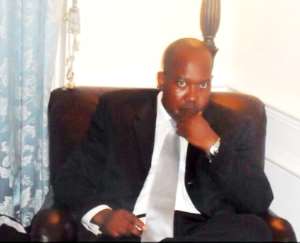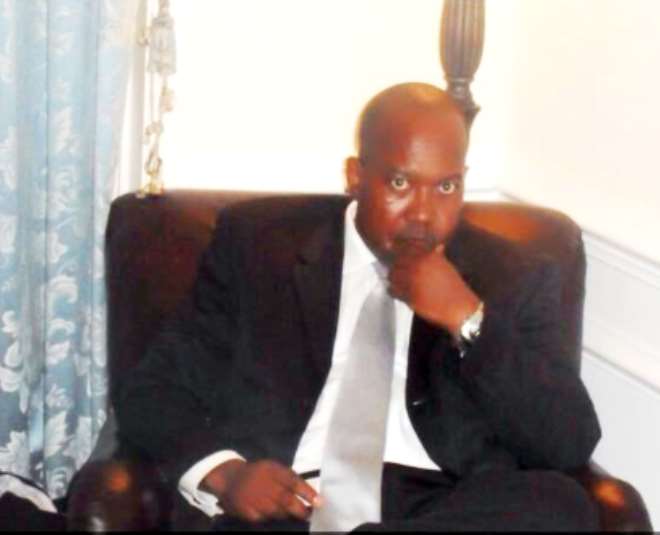
Executive Director of Development Challenge, a research for development policy think tank, Alhaji Haruna Rashid Ibrahim, has underscored the need for science-based research to finding solutions to critical problems of national interest.
According to him, science-based research provided evidence-based information which could be useful to influence and champion development in Ghana.
Alhaji Haruna Ibrahim made these observations at a brief meeting with news editors in Accra to showcase Development Challenge and what it was about to do in Ghana as parts of efforts to enhance development and further influence policies of government.
He disclosed that Development Challenge is a progressive think tank that is focused on finding solutions through research, evidence-based research policy analysis, review, formulation and advocacy basically to find solutions to a lot of the socio-economic problems mainly facing Ghana.
“This was my idea first of all to make an informal introduction to let you know what Development Challenge is about as well as our aims and what we are doing. The main thing is looking at how we can through policy research and advocacy bring some solutions to development problems and also giving voice to the underprivileged in our communities whether it is the plight of students in education to market women or women in general, children and also issues relating to governance.”
On background information, he revealed that Development Challenge was incorporated back in 2007 as a progressive non-profit organization and since that time through its membership growth can boast of a lot of members in the academia and some who are also in business.
"We have captains of industries and some others who have been in government before so from that wide network of people we have been able to put up a lot of policies specifically in agriculture. We have also done some work in education based on a network of volunteers since we truly believe in the spirit of volunteerism.
...We also have a network of people in the Diaspora who have been here and have gone out either working out there or are teaching, in academia and also others very close to retirement who are sharing the knowledge they acquired with us for development," he said.
Touching on funding, he added that they had people who believed in their cause and have given a seed capital and have also instituted the payment of monthly dues contributed by volunteers in the good name of promoting development and to influence government policies.
Alhaji Haruna admitted the credibility gap that his organization had to bridge through repackaging and to re-position itself true to its mandate by putting out evidence based research and science-based research.
"It will take some time but we shall surely get there because we know what we stand for. We have a very good and reliable network system where we put together whatever we write and whatever we have done notes and supportive documents to back any research analysis.
....And I think through this process and being opened to peer review, you begin to build that credibility and people like the media and also the general public will be able to make an assessment as to the common sense denominator of whatever we are putting out there. I believe It is not about the sensationalism and the headline grabbing pronouncements at all; to me, it doesn't make any sense but rather what the information on the research contains."
He said Development Challenge is currently working on projects that have to do with Ghana's urban youth, mainly to woo the urban males especially into agricultural projects.
The Executive Director went on to explain that Development Challenge is working with people to see how they could get the youth into what peri-urban agriculture in a green house where everything is climate controlled from heat, temperature and water.
"We realised that in Accra and Tema it is very difficult to acquire large hectares of lands for projects like these so we are targeting small parcels of lands to set up green houses to encourage this peri-urban agriculture. Green houses are thousand times more productive than the ordinary patches of land.
....You are able to control climate atmosphere to gain about three to four seasons within a year. We have ventures like poultry and animal husbandry in an attempt to get the youth into productive capacities," he emphasized.
Alhaji Haruna Rasheed Ibrahim has a background in Energy and risk management so he tends to really have a soft spot for that area and it also happens to be an area where Ghana is facing challenges.
"I am a Nima boy born and raised in Nima, went to New Nation from there to Nuriya Islamic School and that time they called it Arabic school. I went further to the Ghana National School in Cape Coast and I was fortunate after that to have an opportunity to go to the USA to do my undergrad at the University of Maryland.
....This was where I did Business Administration with concentration on Accounting and after that I did my MBA in Finance and International Relations at the Morgan State University and after that I did my CPA (Certified Public Accountant) which I think is equivalent to the Certified Chartered Accountant here. I have worked with several companies in the US mainly the energy sector which they call utilities in the states. I then concentrated on my own consultancy for a few years and decided to come back and help develop mother Ghana."
 Executive Director of Development Challenge, Alhaji Haruna Rashid Ibrahim
Executive Director of Development Challenge, Alhaji Haruna Rashid Ibrahim




 There’s nothing you can do for us; just give us electricity to save our collapsi...
There’s nothing you can do for us; just give us electricity to save our collapsi...
 Ghanaian media failing in watchdog duties — Sulemana Braimah
Ghanaian media failing in watchdog duties — Sulemana Braimah
 On any scale, Mahama can't match Bawumia — NPP Youth Organiser
On any scale, Mahama can't match Bawumia — NPP Youth Organiser
 Never tag me as an NPP pastor; I'm 'pained' the 'Akyem Mafia' are still in charg...
Never tag me as an NPP pastor; I'm 'pained' the 'Akyem Mafia' are still in charg...
 Your refusal to dedicate a project to Atta Mills means you never loved him — Kok...
Your refusal to dedicate a project to Atta Mills means you never loved him — Kok...
 2024 elections: I'm competent, not just a dreamer; vote for me — Alan
2024 elections: I'm competent, not just a dreamer; vote for me — Alan
 2024 elections: Forget NPP, NDC; I've the Holy Spirit backing me and nothing wil...
2024 elections: Forget NPP, NDC; I've the Holy Spirit backing me and nothing wil...
 2024 elections: We've no trust in judiciary; we'll ensure ballots are well secur...
2024 elections: We've no trust in judiciary; we'll ensure ballots are well secur...
 Performance tracker: Fire MCEs, DCEs who document Mahama's projects; they're not...
Performance tracker: Fire MCEs, DCEs who document Mahama's projects; they're not...
 Train crash: Railway ministry shares footage of incident
Train crash: Railway ministry shares footage of incident
